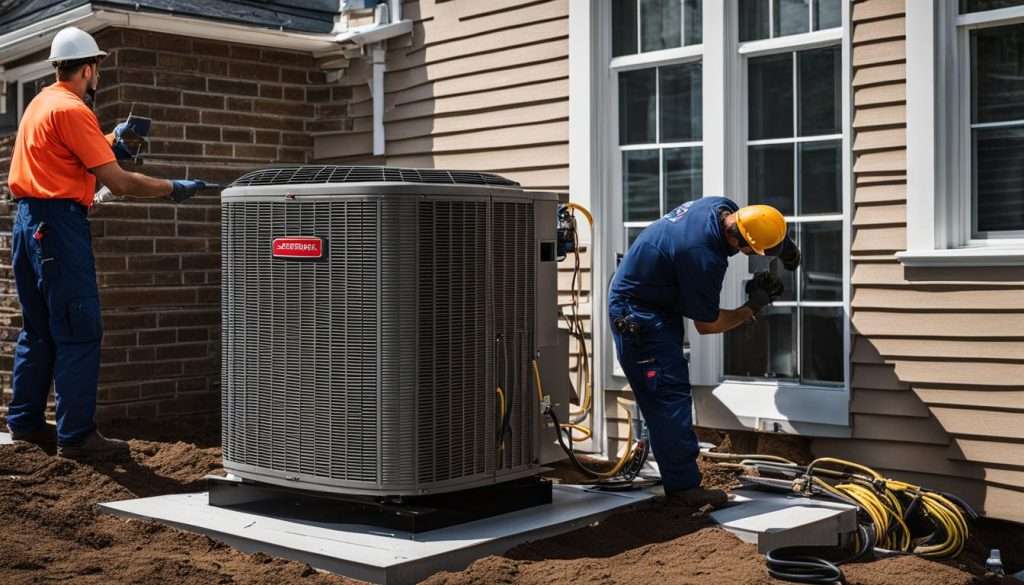Did you know that HVAC system installations can significantly impact the safety and well-being of your home? In fact, according to recent data, improper HVAC installations cause more than 25% of home fires in the United States. This startling statistic highlights the importance of following proper guidelines and obtaining the necessary permits when it comes to installing HVAC systems, especially in states like New Jersey.
In this article, we will explore whether a permit is required for HVAC installation in New Jersey. We will discuss the regulations that govern the permit process and provide clarity on whether homeowners need to obtain a permit before installing HVAC systems in their homes.
Key Takeaways:
- Improper HVAC installations contribute to over 25% of home fires in the United States.
- In New Jersey, homeowners may need to obtain a permit before installing HVAC systems.
- Following proper guidelines and obtaining permits ensures the safety and compliance of HVAC installations.
- Permit requirements help prevent potential hazards and ensure quality workmanship.
- Consulting licensed HVAC professionals can help navigate the permit process and ensure compliant installations.
Understanding NJ HVAC Permit Guidelines
In this section, we will delve into the NJ HVAC permit guidelines. We will explore what constitutes minor HVAC work in NJ and how it differs from major work in terms of permit requirements. Additionally, we will discuss the importance of complying with New Jersey’s building codes and how home improvements relate to HVAC installations.
What Constitutes Minor HVAC Work in NJ?
Minor HVAC work in NJ refers to installations, repairs, or replacements of heating, ventilation, and air conditioning systems that do not significantly alter the structure or safety of a building. Examples of minor HVAC work may include:
- Installing a new air conditioning unit in an existing location
- Repairing or replacing a small section of ductwork
- Upgrading thermostat controls
Distinction Between Major and Minor Work for Permits
It is important to understand the distinction between major and minor work when it comes to HVAC permits in NJ. Major work typically involves significant changes to the HVAC system, such as:
- Installing a completely new HVAC system
- Modifying the layout or design of existing ductwork
- Adding or removing vents and registers
For major HVAC work, obtaining the necessary permits is essential to ensure compliance with local building codes and safety regulations.
New Jersey’s Building Codes and Home Improvements
New Jersey has specific building codes in place to safeguard the quality and safety of construction projects, including HVAC installations. These codes outline the requirements for various aspects of home improvements, including HVAC systems. By adhering to these codes, homeowners can ensure that their HVAC installations meet the necessary standards.
When planning home improvements that involve HVAC systems, it is important to consult the relevant building codes and work with licensed professionals who are familiar with these regulations.
Navigating the HVAC Permit Application Process in NJ
Obtaining an HVAC permit in New Jersey is a crucial step in ensuring a compliant and safe installation. Understanding the HVAC permit application process is essential for homeowners who are planning to install a new HVAC system or make significant modifications to their existing one.
The process of obtaining an HVAC permit in NJ involves several steps that must be followed to ensure legal compliance. By navigating this process smoothly, homeowners can avoid potential fines, penalties, and complications that may arise from unpermitted HVAC installations.
Here is a step-by-step guide to help homeowners navigate the HVAC permit application process in New Jersey:
- Determine the scope of your HVAC project: Start by assessing the nature and extent of the HVAC work you plan to undertake. Whether it’s a complete installation, replacement, or modification, understanding the scope of your project will help you determine the type of permit you need.
- Gather the necessary documentation: Before applying for an HVAC permit, you’ll need to gather the required documentation. This may include architectural plans, equipment specifications, load calculations, and other supporting documents. Ensure that these documents are accurate and up to code.
- Fill out the permit application: Visit your local New Jersey municipality’s building department website or office to obtain the HVAC permit application form. Fill out the form with accurate information, providing all the necessary details about your project and the type of work being performed.
- Submit the permit application: Once you’ve completed the permit application form, submit it to the relevant building department. Ensure that you include all the required documents and fees along with your application. Keep a copy of the application and any supporting documents for your records.
- Await permit review and approval: After submitting your HVAC permit application, it will undergo a review process by the building department. This review typically involves checking the compliance of your project with applicable building codes and regulations. The time it takes to review and approve permits may vary depending on the complexity of the project and the workload of the building department.
- Receive your HVAC permit: Once your permit has been reviewed and approved, you will receive an HVAC permit for your project. This permit authorizes you to proceed with the installation or modification of your HVAC system. Make sure to keep a copy of the permit on-site during the construction process.
- Comply with inspections: Throughout the HVAC installation process, your project may be subject to inspections by the building department. These inspections ensure that the work is being carried out according to approved plans and in compliance with building codes and regulations. Cooperate with the building department and schedule inspections as required.
- Complete the project: Once the HVAC installation or modification is complete and has passed all required inspections, you can experience the comfort and benefits of your new system. Remember, obtaining the necessary permits and complying with the building codes and regulations not only ensures safety and compliance but also protects your investment.
By following these steps and navigating the HVAC permit application process in New Jersey, homeowners can ensure a legally compliant and safe HVAC installation. Seeking the assistance of licensed HVAC professionals can also help streamline the permit application process and ensure that all requirements are properly addressed.
The Role of Licensed Contractors in NJ HVAC Installations
When it comes to HVAC installations in New Jersey, licensed contractors play a crucial role in ensuring compliant and safe systems. Hiring a licensed contractor is not only a legal requirement but also a smart decision that can save homeowners from potential risks and liabilities down the line.
Verification of Contractor Licenses and Registrations
Before hiring a contractor for your HVAC installation project, it is essential to verify their licenses and registrations. This verification process ensures that the contractor is qualified and authorized to perform HVAC work in New Jersey. It is recommended to check the credentials of the contractor through the New Jersey Division of Consumer Affairs Licensing Verification System. This platform provides a reliable way to confirm the contractor’s license status and any disciplinary actions.
The Importance of Contractor Accountability
Contractor accountability is crucial when it comes to HVAC installations. Licensed contractors are held to a higher standard of professionalism and ethics. They are required to adhere to industry regulations, building codes, and safety standards while installing and servicing HVAC systems. By hiring a licensed contractor, homeowners can have peace of mind knowing that the work will be completed with the necessary expertise and accountability.
Ensuring Compliant and Safe HVAC Installations
Compliant and safe HVAC installations are paramount to protect the well-being of homeowners and occupants. Licensed contractors are knowledgeable about the specific requirements and regulations set forth by the state and local authorities. They work diligently to ensure that the HVAC systems are installed correctly, meeting all necessary codes and safety standards. This attention to detail helps prevent potential hazards and ensures the efficient and effective operation of the HVAC system.
Overall, the role of licensed contractors in HVAC installations cannot be understated. Their expertise, accountability, and commitment to compliance and safety are essential for homeowners in New Jersey. By hiring a licensed contractor, homeowners can have confidence in the quality and reliability of their HVAC installation.
Do You Need a Permit to Install HVAC in NJ?’: The Definitive Answer
In the state of New Jersey, the installation of HVAC systems is subject to specific permit requirements. To address the burning question of whether a permit is needed, we dive into the details and provide a clear answer for homeowners.
Yes, you do need a permit to install HVAC systems in New Jersey. The New Jersey Uniform Construction Code (UCC) requires homeowners to obtain permits for HVAC installations, including both heating and cooling systems. This applies to both residential and commercial properties, ensuring that installations meet safety and regulatory standards.
Obtaining an HVAC permit is crucial as it ensures that the installation adheres to the state’s building codes and standards. This helps to protect the safety and well-being of occupants and ensures the proper functioning of the system. Additionally, having a permit for your HVAC installation can provide peace of mind, knowing that your project is in compliance with local regulations.
The HVAC permit requirements in New Jersey vary depending on the scope of the installation. Minor HVAC work, such as replacing HVAC equipment without modifying the existing electrical or plumbing systems, may require a simplified permit process. On the other hand, major HVAC installations or renovations that involve structural changes or alterations to the electrical or plumbing systems may require a more comprehensive permit application.
To determine the specific HVAC permit requirements for your project, it is essential to consult with your local building department. They will provide guidance on the necessary permits, documentation, and fees associated with your HVAC installation.
In the next section, we will guide you through the HVAC permit application process in New Jersey, providing a step-by-step overview to help you navigate the process smoothly.
Consequences of Unpermitted HVAC Installations in New Jersey
In New Jersey, the consequences of unpermitted HVAC installations can be significant. Homeowners may face various risks and liabilities associated with permit evasion, which can have far-reaching effects on their properties and legal compliance. Let’s explore the potential consequences in more detail:
Risks and Liabilities Associated with Permit Evasion
When homeowners choose to evade the HVAC permit process, they expose themselves to several risks and liabilities. Without the necessary permits, the installation may not meet the required safety standards and building codes, compromising the integrity of the system. This can lead to potential hazards, such as fire or gas leaks, endangering the occupants of the property.
In addition, unpermitted HVAC installations can also invalidate insurance coverage, leaving homeowners financially vulnerable in the event of damages or accidents caused by the system. Insurance providers often require proof of proper permits and compliance with regulations as part of the coverage agreement, meaning unpermitted installations may result in denied claims.
Inspection Failures: The Downstream Effects
Another consequence of unpermitted HVAC installations is the risk of inspection failures. Building authorities regularly conduct inspections to ensure that HVAC systems are installed correctly and meet the necessary standards. If an unpermitted installation is discovered during an inspection, homeowners may face significant penalties and fines.
Moreover, inspection failures can result in delays in obtaining the required permits, leading to additional expenses and inconvenience for homeowners who may need to rectify the deficiencies or remove and reinstall the system altogether.
Impact on Real Estate Transactions and Legal Compliance
Unpermitted HVAC installations can have a significant impact on real estate transactions. When selling a property with unpermitted HVAC work, homeowners may encounter difficulties in the sale process. Potential buyers may hesitate to purchase a property with non-compliant installations, leading to longer listing times and decreased market value.
Furthermore, failing to comply with HVAC permit requirements can put homeowners at odds with local building authorities. This can result in legal complications, requiring them to rectify the non-compliant installations, pay fines, and potentially face legal actions.
In summary, the consequences of unpermitted HVAC installations in New Jersey are far-reaching. Homeowners who choose to evade the permit process expose themselves to risks, liabilities, inspection failures, and legal compliance issues. It is essential to prioritize obtaining the necessary permits and ensuring compliance with building codes to avoid these potential consequences.
Leveraging Professional HVAC Services for Compliant Installations
When it comes to HVAC installations in New Jersey, homeowners should prioritize the expertise of professional HVAC services. Collaborating with experienced and licensed HVAC professionals ensures that installations are compliant with the necessary standards and regulations.
Professional HVAC services possess the knowledge and skills to navigate the complexities of HVAC installations in New Jersey. They are familiar with the local building codes and regulations, ensuring that every aspect of the installation process meets the required guidelines. By leveraging their expertise, homeowners can have peace of mind knowing that their HVAC systems are installed correctly and safely.
Furthermore, professional HVAC services have access to the latest industry tools and technologies. They stay updated with the advancements in HVAC systems, allowing them to provide efficient and effective installations. With their expertise, homeowners can optimize their HVAC systems for optimal performance and energy efficiency.
By choosing professional HVAC services, homeowners also benefit from reliable and accountable contractors. Licensed HVAC professionals are held to high standards and are committed to delivering quality workmanship. They take responsibility for their installations, ensuring that every step of the process is carried out with precision and attention to detail.
Moreover, professional HVAC services offer comprehensive services beyond installation. They provide ongoing maintenance and repair services to ensure the longevity and efficiency of HVAC systems. Regular maintenance by professionals helps prevent potential issues, saving homeowners from costly repairs down the line.
In summary, homeowners in New Jersey should rely on professional HVAC services for compliant installations. By collaborating with experienced and licensed professionals, homeowners can trust that their HVAC systems meet the necessary standards and regulations. Professional HVAC services not only deliver quality installations but also provide ongoing maintenance and repair services for long-lasting performance.
Stay tuned for the final section of our article, where we wrap up the key points discussed throughout and provide information on how to contact the authorities for any further questions or inquiries related to HVAC permits in New Jersey.
Conclusion
In conclusion, obtaining HVAC permits is a necessary step for homeowners in New Jersey who are planning to install HVAC systems. The regulations and guidelines set by the state ensure that HVAC installations comply with safety standards and building codes, ultimately protecting the welfare of residents.
Proper HVAC permitting not only ensures compliance but also offers long-term benefits for homeowners. By obtaining permits and having installations inspected, homeowners can have peace of mind knowing that their HVAC systems are safe, energy-efficient, and built to last. Additionally, compliant installations can improve the overall value of a property and contribute to positive real estate transactions.
If you have any questions or inquiries regarding HVAC permits in New Jersey, it is recommended to contact the relevant authorities. They will be able to provide you with specific information regarding the permit application process, requirements, and any other concerns you may have. Taking the time to understand and comply with the permit regulations will ultimately contribute to a successful HVAC installation and ensure a comfortable and safe living environment for you and your family.
FAQ
Do you need a permit to install HVAC in NJ?
Yes, a permit is required for HVAC installation in New Jersey.
What constitutes minor HVAC work in NJ?
Minor HVAC work in New Jersey generally includes repairs, replacements, or installations that do not involve structural changes or major alterations.
What is the distinction between major and minor work for HVAC permits?
Major work for HVAC permits in New Jersey typically involves significant structural changes, modifications, or new installations that require a more thorough review and inspection process.
How do New Jersey’s building codes relate to home improvements?
New Jersey’s building codes outline the requirements and standards that need to be met during home improvement projects, including HVAC installations.
What is the HVAC permit application process in NJ?
The HVAC permit application process in New Jersey typically involves submitting an application, providing necessary documents, and paying the required fees. The application is then reviewed, and once approved, a permit is issued.
Why is it important to verify contractor licenses and registrations?
Verifying contractor licenses and registrations ensures that the HVAC professional you hire is qualified, experienced, and compliant with the regulations and standards set by the state of New Jersey.
What is the importance of contractor accountability in HVAC installations?
Contractor accountability ensures that the HVAC installation is performed correctly, adhering to the necessary codes and regulations, and minimizing the risk of safety hazards or future issues.
How can homeowners ensure compliant and safe HVAC installations?
Homeowners can ensure compliant and safe HVAC installations in New Jersey by hiring licensed and experienced HVAC professionals who follow industry best practices and comply with building codes and regulations.
Do you need a permit to install HVAC systems in New Jersey?
Yes, a permit is required for installing HVAC systems in New Jersey.
What are the consequences of unpermitted HVAC installations in New Jersey?
Unpermitted HVAC installations in New Jersey can lead to risks, liabilities, failed inspections, and potential complications during real estate transactions and legal compliance.
What are the benefits of leveraging professional HVAC services for compliant installations?
Hiring professional HVAC services ensures that the installation is carried out by experienced professionals who are knowledgeable about the regulations and standards, thereby reducing the chances of issues and ensuring compliance.





